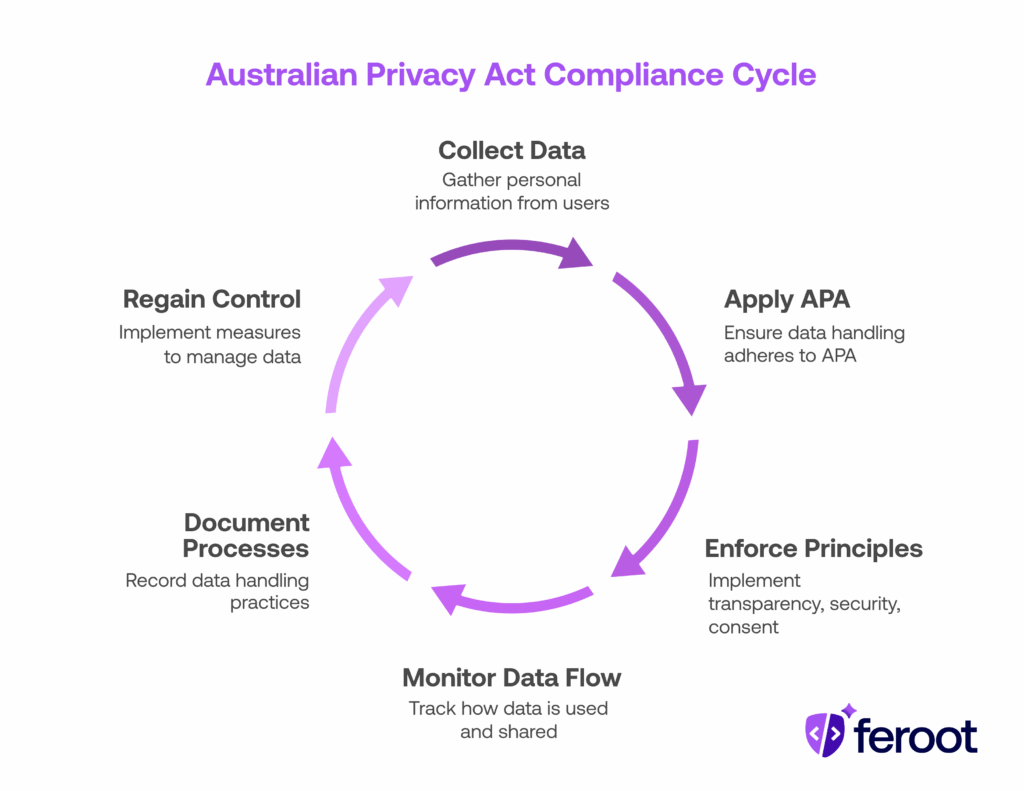TL;DR
- What it is: The Australian Privacy Act 1988 (Cth), or APA, is Australia’s primary data protection law governing how personal information is collected, used, and disclosed.
- Why it matters: The Australian Privacy Act (APA) applies to both Australian organizations and overseas companies handling the personal data of individuals in Australia.
- Who it applies to: Any business with annual revenue over AUD 3 million, as well as healthcare, ad tech, SaaS, and data-driven organizations—especially those operating websites that collect or track personal data.
- Common pitfalls:
- Failing to obtain meaningful consent for data collection (APP 3–5)
- Unmonitored third-party script behavior or cross-border data disclosures (APP 8)
- Inadequate visibility or documentation of personal information handling (APP 1, APP 11)
- How Feroot helps: Feroot empowers organizations to visualize, monitor, and control client-side data collection—delivering transparency, enforcement, and compliance-ready audit trails for APA compliance.
Does the Australian Privacy Act Apply to My Website?
Yes—if your website collects data from individuals located in Australia, the Australian Privacy Act (APA) may apply, even if your company is not based there.
This law is enforced by the Office of the Australian Information Commissioner (OAIC) and governs how “APP entities” handle personal information—including that collected by websites, apps, scripts, and third-party services. The Australian Privacy Act (APA) includes 13 binding Australian Privacy Principles (APPs), which require transparency, security, consent, and accountability across the data lifecycle.
Unfortunately, most modern websites are not built for this level of visibility. Third-party scripts, tag managers, tracking pixels, and marketing tools collect and share personal data in the background—often before users consent or even realize it’s happening.
Feroot helps companies regain control—by mapping, monitoring, and documenting how data flows on the client side.

What Is the Australian Privacy Act?
The Australian Privacy Act (APA) 1988 (Cth) is Australia’s national privacy law. It governs how organizations collect, store, use, and share personal information—including online. The Act includes 13 legally binding Australian Privacy Principles (APPs), which form the core of the regulation.
Key Facts:
- Regulator: Office of the Australian Information Commissioner (OAIC)
- Territorial scope: Australia-based organizations and any overseas companies that handle Australian personal data
Applies to:
- Businesses with revenue over AUD 3 million
- Health service providers (regardless of revenue)
- Ad tech, SaaS, and digital marketing companies
- Any website collecting personal information via cookies, scripts, or trackers
While the APA is under active review to expand protections and align more closely with global laws like the GDPR, its current requirements already demand deep visibility into both back-end and front-end data practices.
Key Australian Privacy Act (APA) Compliance Requirements (by APP)
Here are the Australian Privacy Act (APA) principles most relevant to websites and digital businesses:
- APP 1 – Open and transparent management of personal information
- APP 3 – Collection of solicited personal information must be lawful and fair
- APP 5 – Notification of the collection of personal information
- APP 6 – Use and disclosure of personal information must align with original purpose
- APP 8 – Cross-border disclosure of personal information must be tightly controlled
- APP 11 – Security of personal information
Each principle requires both intent and enforcement—especially for digital platforms where third-party technologies are constantly changing.
Common Australian Privacy Act (APA) Compliance Failures (Especially on the Client Side)
Even large organizations with privacy teams struggle to meet APA requirements when it comes to website data collection. Some of the most common client-side failures include:
- Tracking before consent: Scripts from analytics, ad platforms, or session replays collect user data as soon as the page loads—before meaningful consent is obtained.
- Opaque third-party sharing: Embedded scripts send data to offshore servers without user awareness or proper safeguards (APP 8 violations).
- Insufficient notifications: Privacy notices fail to disclose all the tools collecting personal data—or what they’re doing with it.
- Lack of security controls: JavaScript changes go undetected, exposing data to tampering or unauthorized access (violating APP 11).
- No audit trail: Organizations can’t prove what personal information was accessed, when, or by which scripts—making them vulnerable to enforcement.
As the OAIC increases scrutiny of online tracking and automated decision-making, the risks of client-side blind spots continue to grow.
How Feroot Powers APA Compliance
Feroot’s platform helps security, privacy, and compliance teams enforce APA compliance from the browser up. Here’s how Feroot supports key Australian Privacy Principles:
APP 1 – Open and Transparent Management
Feroot gives teams full transparency into what scripts are running on your website and what data they’re accessing—supporting accurate privacy notices and internal records.
- Map scripts to data collection behavior
- Identifies personal information flows to third-party domains
- Document which tools access data and for what purpose
APP 3 & APP 5 – Lawful and Fair Collection, User Notification
Feroot detects when scripts collect personal data before users consent—a direct violation of fair and lawful collection under APA.
- Flag scripts collecting data without user interaction
- Monitor script behavior before, during, and after consent
- Validate that data collection aligns with your stated policies
APP 8 – Cross-Border Disclosures
Scripts embedded on your site may send data to international domains (e.g., US-based CDNs, ad tech platforms) without proper safeguards.
Feroot helps you:
- Detect outbound data flows to non-Australian servers
- Document data transfers for due diligence under APP 8
- Block or isolate unauthorized cross-border transmissions
APP 11 – Security of Personal Information
Securing personal data means securing the client side, where most unauthorized access occurs. Feroot enables continuous security monitoring:
- Detect and alert on unauthorized script changes
- Identify tampering or injection attempts in real time
- Enforce client-side controls to limit script data access
APA Audit Support – Show Your Work
Regulators expect clear records of what data was collected, how, and by whom. Feroot’s Reporting engine provides that proof:
- Generate script activity logs over time
- Produce visual evidence of data access and sharing
- Maintain a current inventory of all scripts and trackers
This helps demonstrate compliance during OAIC investigations or privacy impact assessments (PIAs).
FAQ
What are the penalties for APA noncompliance?
Penalties can reach up to AUD 2.5 million per violation, with proposed reforms increasing the cap to AUD 50 million or more for serious or repeated breaches.
Does APA apply to third-party cookies and embedded scripts?
Yes. If those tools collect personal data (e.g., IP addresses, behavior), you’re responsible as the controller—even if the data is handled by a vendor.
Can Feroot detect data access before consent is granted?
Absolutely. Feroot monitors all script behavior and alerts teams when unauthorized data collection starts—so you can stop it before it becomes a violation.
How do I control cross-border data transfers under APA?
Feroot maps where data flows—including international endpoints—so you can assess risks, document safeguards, and block unlawful transmissions.
Is Feroot a replacement for a cookie banner or privacy notice?
No—but it makes those tools effective. Feroot ensures that what happens behind the scenes matches what you say publicly—closing the visibility gap.
Conclusion
The Australian Privacy Act demands more than written policies—it requires active enforcement of data protection principles across your digital ecosystem.
Feroot delivers the missing layer of client-side visibility and control—helping you:
- Detect unauthorized tracking
- Monitor third-party script behavior
- Prevent unlawful disclosures
- Generate audit-ready records

